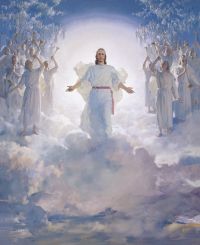- Home
- Our Community
- Our Faith
- Parish Life
- Bulletin
- Contact Us
- Search

33rd Sunday Ordinary Time - Year C
Human life is constituted of a series of days, some significant and memorable, others more routine, mundane and unremarkable. There are birthdays that annually mark the gift that is our time in this world. There are baptismal and name days that celebrate our initiation into the life of God and the believing community. There are burial days that remind us that immortality comes only after mortality is fully experienced. There are other sacramental days that signal our passages along the spiritual way: Eucharist, Reconciliation, Confirmation etc.
Against the backdrop of all these days with their varying levels of meaning and importance for our lives, the liturgy for today invites us to consider the day before which all others pale into relative insignificance – the day of the Lord. Prophesied by Malachi (1st reading Mal 4:1-2) referenced by Paul (2nd reading, 2 Thes 3:7-12) and described by Jesus (Lk 21:5-19), the origins of the Day of the Lord are difficult to trace with certainty. First mentioned by Amos (5:18), it seems to have a popular belief that the prophet referenced and reinterpreted. Prior to Amos, the Day of the Lord was associated with the manifestation of God’s power on behalf of Israel; that day its enemies would be thwarted, and Israel would be securely established as supreme over them. Amos and his prophetic colleagues threw a wrench into the popular notion of the Day of the Lord, promising instead that it would be a day of reckoning for all of mankind, especially Israel. It would be an “evil day” (Amos 6:3) on which the sun would set at noon and the earth grow dark (Amos 8:9). All that were proud and high, all that was lofty and tall would be brought down (Isaiah 2:11 ff).
New Testament authors borrowed the imagery of the Day of the Lord, with its apocalyptic symbols and its ambience of reckoning, judgment and retribution, and associated these with the day of the Son of Man or the time of the second coming of Jesus. But rather than meet that day with dread or prepare for that day with trepidation, believers are encouraged to look beneath their apocalyptic fears and allow these to lead up to new hope and trust in the lessons Jesus left with his disciples. Regarding that day, Jesus advised them not to be misled by the prophets of doom. Rather hold fast to the faith. Be secure in the knowledge that I am with you, providing you with words and a wisdom that will help you to discern the truth and to continue witnessing to me in word and work.
